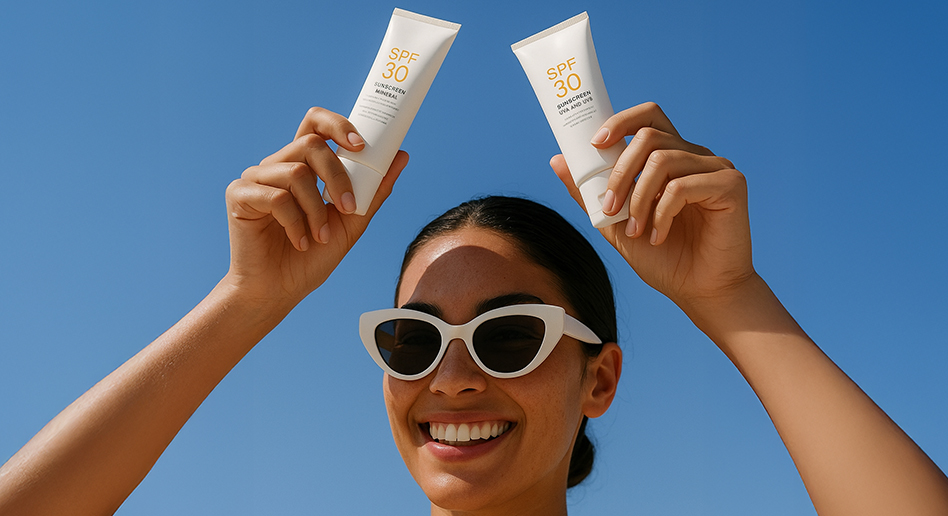6th AUG 2025
Chemical vs Mineral Sunscreen

Skinsights > Chemical vs Mineral Sunscreen
Chemical vs Mineral Sunscreen: Which One Actually Works?
- Sunscreen aisles can feel like navigating a chemistry lab. Chemical filters, mineral barriers, SPF numbers, and marketing claims everywhere—but what actually matters for your skin?
- The truth is simpler than brands want you to believe. Both chemical and mineral sunscreens work, but they work differently. Understanding these differences helps you pick the right one for your skin type, lifestyle, and concerns. No PhD in chemistry required.
- Here's what dermatologists actually recommend, minus the marketing fluff.
How Chemical and Mineral Sunscreens Work
- The science behind sun protection comes down to two approaches: absorption and reflection. Both get the job done, but through different mechanisms.
Chemical Sunscreens: The Absorbers
- Chemical filters like avobenzone, octinoxate, and octocrylene work by absorbing UV rays and converting them into harmless heat energy. Think of them as tiny sponges that soak up harmful radiation before it reaches your skin cells.
- These formulas blend seamlessly into skin without leaving visible residue. They're lightweight, spread easily, and work well under makeup. The trade-off? They can occasionally trigger reactions in sensitive skin types.
Mineral Sunscreens: The Reflectors
- Mineral sunscreens contain zinc oxide or titanium dioxide—ingredients that primarily absorb UV rays while also reflecting a small portion (about 5% of UV rays). Despite common misconceptions, modern mineral formulas don't just sit on your skin's surface like armor. They work through absorption, just like chemical filters.
- The difference lies in how your skin tolerates them. Mineral ingredients are generally gentler and less likely to cause irritation, making them ideal for reactive skin types.
Which Sunscreen Should You Choose?
- Your skin type and lifestyle determine which formula works best. Here's how to decide.
For Sensitive or Reactive Skin and Pregnancy
- Mineral sunscreens win for sensitive skin types. Zinc oxide and titanium dioxide rarely trigger allergic reactions or irritation. If you have rosacea, melasma, or skin that flares up easily, mineral formulas provide effective protection without the drama.
- Parents often prefer mineral sunscreens for children's delicate skin. The gentle ingredients make them suitable for daily use without worry about reactions.
For Daily Wear and Makeup Compatibility
- Chemical sunscreens excel at invisible protection. They blend seamlessly under foundation, don't leave white residue, and feel lightweight on skin. If you wear makeup daily or prefer sunscreen that disappears after application, chemical formulas deliver.
- Many people find chemical sunscreens more comfortable for extended wear, especially during workouts or long days outdoors.
For Darker Skin Tones
- The white cast issue is real with mineral sunscreens, particularly on deeper skin tones. While tinted mineral formulas help bridge this gap, chemical sunscreens typically blend more naturally across all skin colors.
- However, don't write off mineral options entirely. Many brands now offer mineral formulas specifically designed to minimize white cast, with some performing just as well as chemical alternatives.
Safety Concerns: Separating Fact from Fear
- Sunscreen safety discussions often spiral into unnecessary panic. Here's what the science actually shows.
Are Chemical Sunscreens Safe?
- Yes, for the vast majority of people. Concerns about chemical filters typically stem from laboratory studies using unrealistic concentrations—think bathing in pure sunscreen rather than normal application.
- The FDA continues to evaluate sunscreen ingredients, but current approved chemical filters have decades of safe use data. The benefits of consistent sun protection far outweigh theoretical risks from chemical absorption.
Application Tips That Actually Matter
- No sunscreen works if you don't use it properly. These application guidelines apply regardless of which type you choose.
- Apply generously—most people use about half the recommended amount. You need roughly a teaspoon for your face and neck, which is more than you think.
- Reapply every two hours, or immediately after swimming or sweating. This rule applies to both chemical and mineral formulas, despite marketing claims about 'all-day protection.'
- Don't forget often-missed spots: ears, neck, hands, and the area around your eyes. These zones frequently show the first signs of sun damage.
The Bottom Line on Sunscreen Choice
- The best sunscreen isn't the most expensive or the one with the longest ingredient list. It's the one you'll use consistently, apply generously, and reapply regularly.
- Chemical sunscreens work well for most people and offer cosmetic elegance that encourages daily use. Mineral options provide gentler protection for sensitive skin types and those who prefer physical barriers.
- Stop overthinking the choice and start prioritizing consistent use. Your future skin will thank you for any broad-spectrum SPF 30+ sunscreen applied properly, regardless of whether it's chemical, mineral, or a combination of both.
- Choose based on your skin's needs, your lifestyle, and what feels comfortable enough to use every single day. That's the real secret to effective sun protection.

